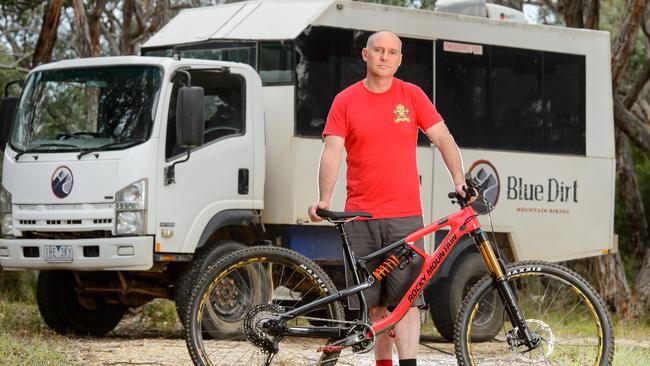Kickstart Victoria: Technology can ensure tourist sites can safely reopen
A Melbourne-designed device could be used by tourism sites to ensure they reopen safely, but businesses have been unable to meet with DHHS to discuss the options.
Coronavirus
Don't miss out on the headlines from Coronavirus. Followed categories will be added to My News.
Technology is available that could allow tourism sites to safely reopen immediately - but industry experts can’t get a sit-down with the powerbrokers who make the decision.
Felicia Mariani, chief executive of Victoria Tourism Industry Council, said there were pioneering smart devices that could allow many venues to reopen but heads of business can’t meet with DHHS representatives.
She flagged Smart Badge, a Melbourne-designed device, which provides social distancing alerts, instant contact tracing and capacity controls to monitor how many people are in a building.
“Here is a great innovation coming out of Victoria but we are not applying that innovation here,” Ms Mariani said.
“So if I walk into a space with quite a lot of people, I can feel comfort that there is enough space to maintain density to keep myself safe. An amazing innovation from people, right here in Victoria.”
But she said the people who decided when tourism sites could reopen were not talking to them.
“If there is some way and somehow we can have representatives within DHHS that are dedicated to different sectors, to work through with those sectors, to deal with a safe and reasonable timeline to reopening,” she said.
“How do we make sure we are working closely with people who are formulating these plans?
“We need to get some of these innovations in front of the people who can help us put together a reasonable timeline for how we can activate.
“That’s the key thing we’re asking for.”
Ms Mariani said every day that passed without businesses reopening was a lost opportunity.
“By the time we get to reactivate our industry, we will be six months behind the rest of the country.
“They (interstate tourism sites) started back in June, and it will be December before we get to any sort of modicum of what normal will look like,” she said.
Ms Mariani said Smart Badge and other devices were “phenomenal innovations” that proved “how we as a sector could balance social density and distancing”.
Gab Robinson, CEO of business Harry the Hirer, which came up with Smart Badge, said the device was being tested in the events industry but also abattoirs and construction sites.
He said his company lost 100 per cent of its business when the crisis hit.
“So we had to think of ways that would enable the industry to rebound quicker.”
Staff with a background in programming then came up with Smart Badge.
“We know if someone catches coronavirus, who they have been in close contact with and so we don’t have to shut down the whole [workplace] because we know they have only been in a certain area and with who.”
He added: “It’s application is limitless. It’s getting interest from all around Australia and the world.
It’s just about initiative, you don’t give up - your employees are incredible people and they come up with amazing ideas like this.”

COMMONSENSE IS THE SOLUTION
Brett Hollis believes his mountain biking business could thrive if only commonsense was applied.
Under current restrictions, Blue Dirt Mountain Biking is safe to operate - the only problem is clients cannot be shuttled up hills to the point they begin their adventure.
“It seems there is a range of restrictions on different facets of tourism and they are all fairly inconsistent. We run a mountain bike uplift service, some trips are only eight minutes, but we are not allowed to operate (the uplift service) until Covid normal, where there are 28 days with no cases,” Mr Hollis said.
“And yet I can grab an Uber, grab a taxi and jump in public transport and there’s no density requirements. On the last step [in November] I can open up our accommodation that has shared communal facilities...40 strangers in one kitchen, not a problem - but I still can’t put 10 people in a mini bus for eight to 15 minutes.”
A normal summer would see 20,000 mountain bikers, but Mr Hollis was unsure what this summer would look like.
“We had to turn away 1000 people over the school holidays.”
They have developed a Covid-safe plan that includes reduced capacity in the mini vans, hand sanitiser, social distancing in lines, equipment only touched by the client and multiple cleans of the vans each day.
“At a reduced capacity you are not really making much, you’re just covering costs.”
His message to decision-makers was simple: there are ways to make this work and also be mindful of the public health concerns.
“There are a multitude of ways for what is essentially a very short trip. To keep people employed, keep tourists coming to the region. On top of that there is an effect on other businesses when people come to the region to go mountain biking - where they stay, where they eat, all spending more money.”
MORE NEWS:
HOW TO REVIVE MELBOURNE’S COVID-DEVASTATED CBD
REBOOTING MAJOR EVENTS KEY TO VICTORIA’S RECOVERY

